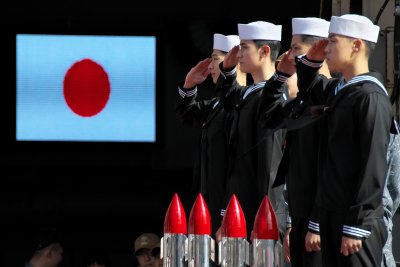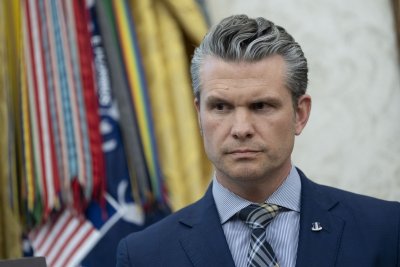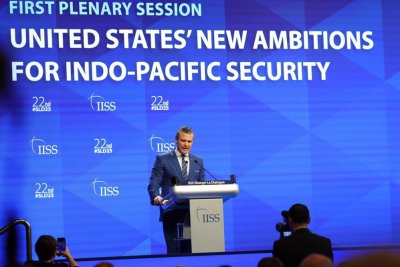Defense Secretary Pete Hegseth says nations must prepare for war to ensure peace amid Chinese aggression in the Indo-Pacific region during the International Institute for Strategic Studies Shangri-la Dialogue Defence Summit in Singapore on Saturday. Photo by How Hwee Young/EPA-EFE
May 31 (UPI) — The United States and its allies won’t allow China to dominate the Indo-Pacific region, but do not seek war, Defense Secretary Pete Hegseth said Saturday morning in Singapore.
He addressed regional concerns while speaking during the International Institute for Strategic Studies Shangri-La Dialogue event in Singapore.
Hegseth said the Indo-Pacific region is the United States’ “priority theater” and won’t allow China to push the United States and its allies out of the region, the Department of Defense announced Friday in a news release.
Instead, deterrence will be the primary tool by which the United States and its allies will counter any aggressive moves made by China, particularly in the South China Sea and against Taiwan.
“As our allies share the burden, we can increase our focus on the Indo-Pacific,” Hegseth said, adding that the region is the nation’s “priority theater.”
He said the futures of the United States and its allies in the Indo-Pacific depend on each other.
“We share a vision of peace and stability, of prosperity and security,” Hegseth said, “and we are here to stay.”
Common sense and national interests with guide policy making in the region, while respecting mutual self-interests.
President Donald Trump is working to get European nations to do more to increase their respective national security interests instead of largely relying on the United States.
As European nations do more to protect themselves, Hegseth said the United States will be better able to focus on matters in the Indo-Pacific region and do more to thwart Chinese aggression.
“This enables all of us to benefit from the peace and stability that comes with a lasting and strong American presence here in the Indo-Pacific,” Hegseth said.
That presence won’t come at a cost for the nation’s allies, though.
“We are not here to pressure other countries to embrace and adopt our politics or ideology,” Hegseth told the audience. “We are all sovereign nations.”
He said the United States does not “seek conflict with communist China.”
But the United States “will not be pushed out of this critical region,” Hegseth added. “And we will not let our allies and partners be subordinated and intimidated.”
He said China’s leaders are “preparing to use military force to alter the balance of power in the Indo-Pacific,” including occupying Taiwan.
Any move by China to take over Taiwan, which China has claimed as part of its sovereign state, would trigger “devastating consequences” for the region and the world, Hegseth told the audience.
“The threat China poses is real, and it could be imminent,” he said, adding that the United States and its allies must be prepared with “urgency and vigilance.”
If deterrence doesn’t work and a fighting war is inevitable, “we are prepared to do what the Department of Defense does best: to fight and win decisively,” Hegseth said.
The best way to ensure peace is to prepare for war, “but we have to do this quickly,” he said. “We have no time to waste.”






